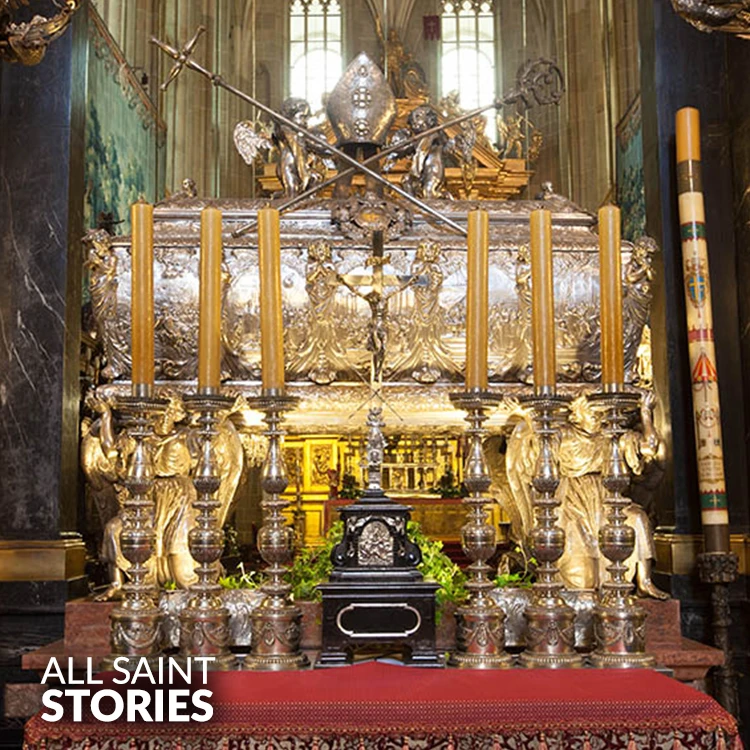"Saint Stanislaus, faithful servant of God, guide us with your unwavering faith and devotion. Intercede for us in our struggles, that we may live with courage and holiness. Help us to remain steadfast in our faith and to always seek the will of God. Amen."
ST. STANISLAUS
ST. STANISLAUS

St. Stanislaus of Szczepanów was a Polish bishop and martyr known for his fearless defense of the faith. He was a staunch critic of King Bolesław II, which led to his martyrdom in 1079. Revered as the patron saint of Poland, his death marked a pivotal moment in the Polish Church, and he remains an influential figure in Polish history and Catholic tradition.
St. Stanislaus was born in 1030 in Szczepanów, a village in what is now Poland. He was educated in both Poland and abroad, gaining a reputation as a learned and pious man. After his ordination, he rose to prominence as the Bishop of Kraków. As bishop, St. Stanislaus worked tirelessly to combat the corruption and immorality in the court of King Bolesław II, whom he confronted about his actions. The king, enraged by Stanislaus's outspoken criticism, ordered the bishop's execution in 1079.
Stanislaus was killed in a brutal manner, and his martyrdom is one of the key moments in the history of the Polish Church. His body was buried in the Kraków Cathedral, where it became a site of veneration. The church and Polish society were deeply affected by his death, with many seeing him as a martyr for both faith and justice.
In 1253, St. Stanislaus was canonized by Pope Innocent IV, further cementing his place as a revered figure in Poland. Over time, his reputation spread throughout Europe, and he was recognized as a powerful intercessor, particularly in matters of justice and faith. His feast day, celebrated on April 11, honors his legacy as a protector of the faithful and a defender of Christian values against corruption and tyranny.
Today, St. Stanislaus is one of Poland's most significant saints, and his influence continues to be felt in the spiritual and cultural life of the nation. He is venerated not only in Poland but also in many places around the world, especially among Polish diaspora communities. As the patron saint of Poland, his life and death remain a symbol of courage, righteousness, and devotion to God.
Video Not Found
The information on this website is compiled from various trusted sources. While we aim for accuracy, some details may be incomplete or contain discrepancies.
If you notice any errors or have additional information about this saint, please use the form on the left to share your suggestions. Your input helps us improve and maintain reliable content for everyone.
All submissions are reviewed carefully, and your personal details will remain confidential. Thank you for contributing to the accuracy and value of this resource.
Credits & Acknowledgments
- Anudina Visudhar (Malayalam) – Life of Saints for Everyday
by Msgr. Thomas Moothedan, M.A., D.D. - Saint Companions for Each Day
by A. J. M. Mausolfe & J. K. Mausolfe - US Catholic (Faith in Real Life) – Informational articles
- Wikipedia – General reference content and images
- Anastpaul.com – Saint images and reflections
- Pravachaka Sabdam (Malayalam) – Saint-related content and insights
We sincerely thank these authors and platforms for their valuable contributions. If we have unintentionally missed any attribution, please notify us, and we will make the correction promptly.
If you have any suggestion about ST. STANISLAUS
Your suggestion will help improve the information about this saint. Your details will not be disclosed anywhere.
© 2026 Copyright @ www.allsaintstories.com








 English
English
 Italian
Italian
 French
French
 Spanish
Spanish
 Malayalam
Malayalam
 Russian
Russian
 Korean
Korean
 Sinhala
Sinhala
 Japanese
Japanese
 Arabic
Arabic
 Portuguese
Portuguese
 Bantu
Bantu
 Greek
Greek
 German
German
 Dutch
Dutch
 Filipino
Filipino